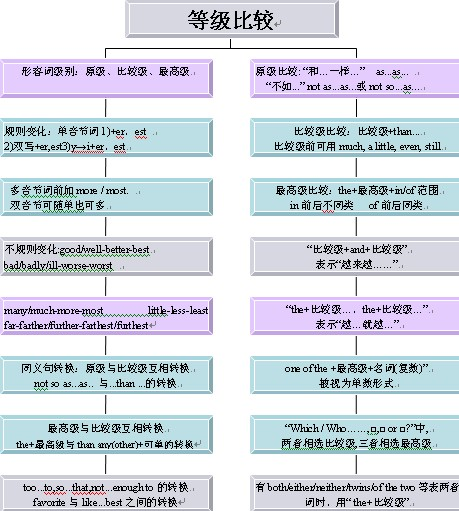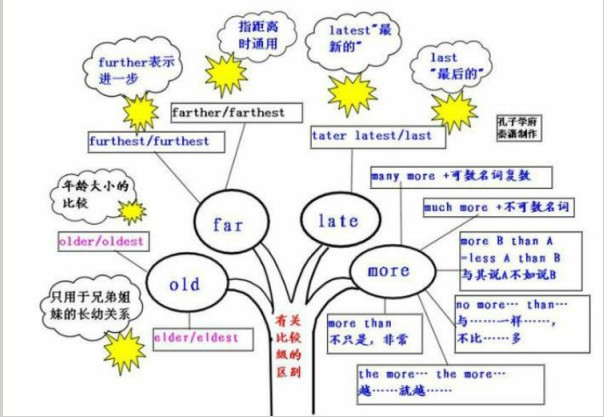本试题 “________other workers. the boss finds. Hank is________worker in his company.[ ] A. Compared with; a more satisfyingB. Compared to; the more satisfy...” 主要考查您对形容词的比较级
过去分词
等考点的理解。关于这些考点您可以点击下面的选项卡查看详细档案。
- 形容词的比较级
- 过去分词
形容词比较级概念:
大多数形容词(性质形容词)有比较级,用来表示两个人或事物之间的比较“较……”。
如:I am taller than you.
形容词比较级特殊用法:
1、没有比较对象的比较结构:
所谓没有比较对象的比较结构不是指省略而言,而是指并非真正的比较。
例如:The car runs faster than110 miles. 那辆车时速为110多英里。
There is more than one solution to the problem. 这个问题的解决办法不止一个。
The daily cost in an average hospital in the United States can run as high as $250. 在美国普通医院的每天的费用可高达250美元。
2、用比较级的形式表达最高级的意思:
在这种情况下,往往是将一个人或是一件事与其他所有的人或事相比较。注意别忘了常在比较状语中用any, other, else类的字眼,以将比较主体排除在比较对象以外,因为自己不可以与自己相比较。
例如:He is taller than any one else in our class. 他在我们班比其他任何都高。
Iron is more useful than any other metals. 铁比其他任何金属更有作用。
3、no+比较级+than的结构表示“A和B一样不……”:
例如:She runs no faster than her sister.她与她妹妹一样跑不快。
Tom is no wiser than John. 汤姆和约翰一样没有聪明才智。
He is no richer than his brother. 他与他弟弟一样不富有。
4、汉语可以说“昆明的气候比兰州好”。英语必须加that:
例如:The climate of Kunming is better than that of Lanzhou.
5、英语比较级常译作“较…”、“…一些”等,但不等于汉语的“更…”。汉语的“更…”须用“still”或“even”来表示:
如:This book is even more difficult than that one. 这本书比那本书更难。
6、有些情况下,汉语不用“较”等字眼,英语则须用比较级:
如:Will the younger people give their seats to old people? 请年轻人把座位让给老年人好不好?
形容词比较级的用法:
1、比较级用于二者的比较,其结构是:含有形容词比较级的主句+从属连词than引导的从句(从句中常省去意义上和主句相同的部分)。
如:Li is older than Zhou. 李比周年纪大。(从句中省去了is old)
There are more children in this nursey than in that one. 这个托儿所的孩子比那个托儿所多。(从句中省去了there are children)
After two years' physical training, she is healthier and stronger. 经过两年的体力锻炼,她(比以前)健康强壮多了。(注意这里省去了从句than she was)
We are much better off than ever before. 我们的生活比过去任何时候都要好得多。(than后省去了we were)
Paul weighs less than harry. 保尔的体重比哈利轻。
Mary is less clever than Jane. 玛丽不如简那么聪明。
2、可修饰比较级的词:
1)a bit, a little, rather, much, far, by far, many, a lot, lots, a great deal, any, still, even等
2)还可以用表示倍数的词或度量名词作修饰语。
3)以上词(除by far)外,必须置于比较级形容词或副词的前面。
典型例题:
1)—Are you feeling ____?
—Yes,I'm fine now.
A. any well
B. any better
C. quite good
D. quite better
答案:B. any可修饰比较级,quite修饰原级,well的比较级为better.
2)The experiment was____easier than we had expected.
A. more
B. muchmore
C. much
D. moremuch
答案:C. much可修饰比较级,因此B,C都说得通,但easier本身已是比较级,不需more,因此C为正确答案。
3)If there were no examinations, we should have___at school.
A. the happiest time
B. a more happier time
C. much happiest time
D. a much happier time
答案:D.
注:many, old和far用法:
1)如果后接名词时,much more+不可数名词 many more+可数名词复数
2)old有两种比较级和最高级形式:older/oldest和elder/eldest。elder,eldest只用于兄弟姐妹的长幼关系。
如:My elder brother is an engineer.
3)far有两种比较级,farther,further在英语中两者都可指距离。在美语中,father表示距离,further表示进一步。
如:I have nothing further to say.
3、比较级中的两个特殊作用的结构:
1)The+比较级+句子,表示的意义是“越(怎么样就)越(怎么样)”,在这个结构中的两个“比较级”不要求一定词性相同,它们各自的词性要依句子的需要而定;
2)和比较级+and+比较级。表示的意义是“越来越(怎么样)”,在这个结构中的两个“比较级”则要求词性相同。
例如:The harder you work at your study, the better academicrecords you will have. 你学习越努力,你的成绩就越好。
The more we have, the more we want. 人欲无穷。
When winter is coming, it gets colder and colder. 冬天来临之际,天越来越冷了。
He became less and less satisfied with the foot ball team's performance. 他对足球队的表现越来越不满意了。
形容词比较等级知识体系:

特殊形容词比较级变化:

过去分词的概念:
过去分词一般表示完成和被动的动作,只有一种形式。即:动词原形加-ed构成。
如:fallen leaves 落叶
boiled water 开水
I heard the door closed. 我听见门被关上了。
过去分词与现在分词被动式的区别:
两者均可表示被动,其区别主要在于它们所表示的时间概念不同,但有时它们也可表示相同的意思。
如:Written in haste, the book has many mistakes. 这书因写得仓促,所以错误不少。
Being written in haste, the book has many mistakes. 这书因写得仓促,所以错误不少。
Having been written in haste, the book has many mistakes. 这书因写得仓促,所以错误不少。
有时虽然所表示的时间概念相同,但有细微区别:
如:Having been show the lab, we left. 被领着看了实验室后,我们就离开了。
过去分词的句法功能:
1、作定语:
如:I don't like the book written by Martin.
Our class went on an organized trip last Monday. 上周一我们班开展了一次有组织的旅行。
注意:当过去分词是单词时,一般用于名词前,如果是过去分词短语,就放在名词的后面。过去分词做定语相当于一个被动语态的定语从句。
2、过去分词作表语:
如:They were very excited at the news. 听到这个消息,他们非常激动。
The window is broken. 窗户破了。
They were frightened at the sad sight. 他们对眼前悲惨的景象感到很害怕。
注意:be+过去分词,如果表示状态是系表结构,如果表示被动的动作是被动语态。
区别:The window is broken.(系表)
The window was broken by the boy.(被动)
有些过去分词是不及物动词构成的,不表示被动,只表示完成。
如:boiled water(开水) fallen leaves(落叶) newly arrived goods(新到的货) the risen sun(升起的太阳) the changed world(变了的世界)
这类过去分词有:gone, come, fallen, risen, changed, arrived, returned, passed等。
3、过去分词作宾语补足语:
如:I heard the song sung several times last week. 上周我听见这首歌被唱了好几次。
有时过去分词做with短语中的宾语补足语:
如:With the work done, they went out to play. 工作做完了,他们出去玩去了。
4、过去分词作状语:
如:Praised by the neighbours, he became the pride of his parents. 受到邻居们的表扬,他成为父母的骄傲。(表示原因)
Onceseen, it can never be forgotten. 一旦它被看见,人们就忘不了。(表示时间)
Given more time, I'll be able to do it better. 如果给予更多的时间,我能做得更好。(表示条件)
Though told of the danger, he still risked his life to save the boy. 虽然被告之危险,他仍然冒生命危险去救那个孩子。(表示让步)
Filled with hopes and fears, he entered the cave. 心中充满了希望与恐惧,他走进山洞。
5、过去分词与逻辑主语构成独立主格:
如:All books returned at the end of the term, the library assistant was satisfied. 所有的书期末时都还了,图书管理员很高兴。
The field ploughed, he began to spread seed. 地耕好了,他开始撒种子。
现在分词与过去分词的区别:
1、分词作表语:
分词做表语有两种情况,一种是现在分词做表语,一种是过去分词做表语,这两者区别是考试中经常考到的地方。一般来说,表示心理状态的动词如excite,interest等都是及物动词,汉语意思不是“激动”,“高兴”,而是“使激动”、“使高兴”,因而现在分词应该是“令人激动的”、“令人高兴的”,过去分词则是“感到激动的”和“感到高兴的”。所以,凡表示“令人……的”都是-ing形式,凡是表示“感到……”都用-ed形式。换句话说,若人对……感兴趣,就是somebody is in terestedi n...,若人/物本身有兴趣时,就是说sb./sth. is interesting。这类词常见的有:
interesting 使人感到高兴—interested感到高兴的
exciting令人激动的—excited感到激动的
delighting令人高兴的—delighted感到高兴的
disappointing令人失望的—disappointed感到失望的
encouraging令人鼓舞的—encouraged感到鼓舞的
pleasing令人愉快的—pleased感到愉快的
puzzling令人费解的—puzzled感到费解的
satisfying令人满意的—satisfied感到满意的
surprising令人惊异的—surprised感到惊异的
worrying令人担心的—worried感到担心的
如:Travelling is interesting but tiring. 旅行是有趣的,但是使人疲劳。
The pupils will get confused if they are made to learn too much. 如果要学生学得太多,他们会感到糊涂的。
The game is exciting. (现在分词作表语)
We were excited at the news. (过去分词作表语)
2、分词作定语:
分词作定语时有下面几个特点:
1)现在分词表示主动意义,过去分词一般表示被动含意。
2)现在分词表示正在进行,过去分词表示状态或做完(完成)的事。
如:He rushed into the burning house. 他冲进了正在燃烧着的房子。
The child standing over there is my brother. 站在那儿的男孩子是我弟弟。
The room facing south is our classroom. 朝南的房间是我们的教室。
He is an advanced teacher. 他是个先进教师。
3)下列不及物动词也以过去分词形式做定语或表语,但不具有被动意义,这点要注意:
departed, elapsed, faded, fallen, gone, frown-up, retired, returned, risen, set, vanished, much-traveled, newly-arrived, recently-come
3、分词作状语:
现在分词做状语与过去分词做状语的最主要区别在于两者与所修饰的主语的主动与被动关系的区别。
1)现在分词作状语时,现在分词的动作就是句子主语的动作,它们之间的关系是主动关系。
如:He went out shutting the door behind him. 他出去后将门随手关上。
Not knowing what to do, he went to his parents for help. 由于不知如何办是好,他去找父母帮忙。
Smiling, they came in.
2)过去分词作状语时,过去分词表示的动作是句子主语承受的动作,它们之间的关系是被动关系。
如:Cleaned, the room looks nice.
Given more attention, the trees could have grown better. 如果对这些树多关心一些,它们本来会长得更好。
Faced with difficulties, we must try to overcome them. 在遇到困难的时候,我们必须设法克服。
与“________other workers. the boss finds. Hank is________wor...”考查相似的试题有:
- . -What a pity! I haven't got a ticket for the football match.(杭州市)-Don't worry. It'll be broadcast______on TV....
- -Did you enjoy yourself at the party?-Yes.I have never been to ________ one before.[ ]A.a more excitedB.the most ex...
- You'd better go there by train.The train ticket is________the airplane ticket.[ ]A. as cheap three times asB. as thre...
- 2. Jack is late again. It is_________of him to keep others waiting.A.normalB.ordinaryC.commonD.Typical
- This new kind of chemicals will help keep the air, soil and water________ from pollution.A.freeB.emptyC.looseD.short
- At that time people would starve if food was difficult _______, especially during the cold winter months.A.findingB...
- Some students from Grade 9 ____ do some ____ for the old.A.volunteered to; cleanB.volunteered; cleaningC.volunteer...
- The building ______ will be completed in two months.A.paintingB.being paintedC.to have paintedD.painted
- 11.________ with fire in the garden ,the boy got ________.A.Playing;burningB.Played;burningC.Played; burntD.Playi...
- China first agreed the six-party talks about North Korea nuclear weapons program.A.to attendB.to joinC.to particip...